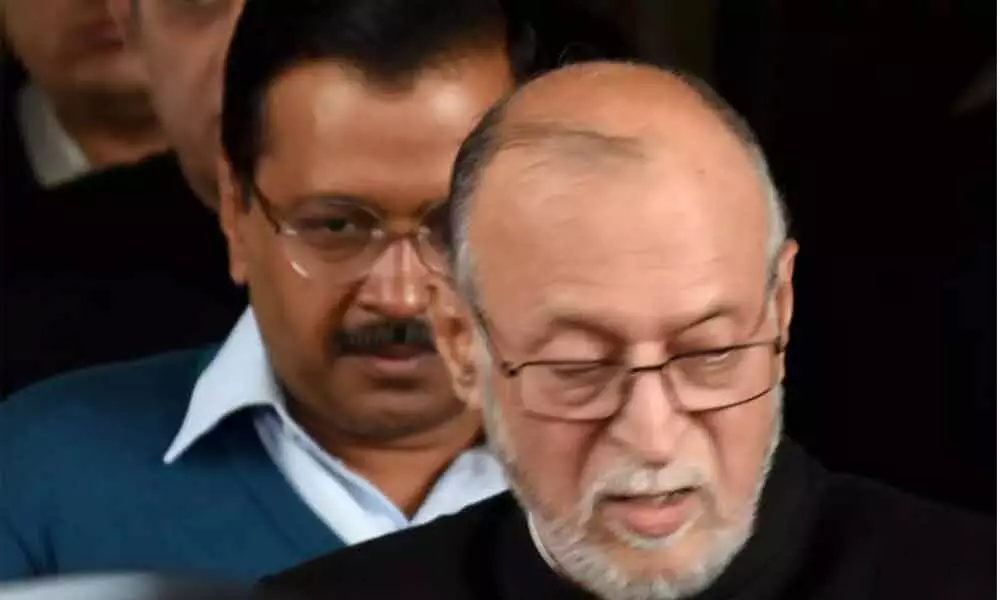Live
- CPI launches centenary celebrations in Ongole
- Skater Jessy Raj Matrapu receives national award
- Cantt MLA takes up rps’ issues with CM
- Include tourism under PSL, AP Chambers appeals to RBI
- CPI Centenary Celebrations: Flag hoisting held at 32 locations in EG dist
- Congress on plans 'Save Constitution' drive
- Deep sea mission in early 2026
- Police arrest 3 persons over body parcel to family
- Medical camp held in Maoist area
- CM Cup 2024: Telangana Gears Up for State-Level Sports Fest
Just In
New law leaves elected govt toothless, all powers with LG


The new act notified by the Centre has left Delhi's elected government virtually toothless by giving sweeping powers to the lieutenant governor who now controls nearly 80 departments and can even stall a bill enacted by the assembly, officials said.
New Delhi: The new act notified by the Centre has left Delhi's elected government virtually toothless by giving sweeping powers to the lieutenant governor who now controls nearly 80 departments and can even stall a bill enacted by the assembly, officials said. After the Government of National Capital Territory of Delhi (Amendment) Act, 2021, was notified on Tuesday night, the LG, in layperson terms, would be the one running the national capital henceforth, officials explained while assessing the import of the Act coming into effect. The Act, passed by Parliament last month, came into force on April 27, Tuesday, the Ministry of Home Affairs said in an order. Under the new law, "government" now means the LG, officials said. The Delhi government will have to take permission from the LG before taking any action on subjects that had so far been under its control. These include anti-corruption, education, health, social welfare, tourism, central jail, excise, some colleges as well as hospitals and transport. The LG can also pass directions to officials directly without consulting the city government while elected representatives will have to take the LG's consent for the implementation of any of its orders as well as transfers, the officials explained.
According to officials, Delhi is a union territory with a legislature like Jammu and Kashmir and Puducherry but does not have powers similar to them.
Three key subjects -- public order, police and land - are with the Central government while other sectors are with the city government. However, after the new Act, the Delhi government will have to get the LG's nod for making any minor or major changes.
"It has become necessary to make it clear that Delhi is a UT with limited powers. It is not a full state and those in the powers of the Delhi government must understand this fact," one official told PTI while explaining the reasons behind bringing in the new law.
The Delhi assembly can make laws on all subjects in the state list and concurrent list but it shall not come into force until the LG gives his assent. "Any of the rules made in contravention of this proviso, before the commencement of the Government of National Capital Territory of Delhi (Amendment) Act, 2021, shall be void," states the new act. In the case of Jammu and Kashmir and Puducherry, land is with the local government and public order and police with the Central government. Other UTs — Chandigarh, Ladakh, Andaman and Nicobar Islands, Lakshadweep and Dadra and Nagar Haveli and Daman and Diu — don't have legislative assemblies and are under direct control of the Central government.
Officials said the executive powers of the LG of Delhi are different from the powers of state governors and the amendment in the Government of NCT of Delhi Act will remove ambiguities in the existing law.
The Centre has been maintaining the bill is in line with the Supreme Court's July 2018 ruling on the ambit of powers of the lieutenant governor and the Delhi government after a series of run-ins between the two.
Union Minister of State for Home G Kishan Reddy had said in Parliament that Delhi is not a full-fledged state and does not have full power. "The said bill will promote harmonious relations between the legislature and the executive, and further define the responsibilities of the elected government and the L-G, in line with the constitutional scheme of governance of the National Capital Territory of Delhi, as interpreted by the Supreme Court," the statement of objects of the bill had said.
In June 2018, Chief Minister Arvind Kejriwal and his Cabinet ministers had staged a sit-in at the lieutenant governor's office as a power tussle between the then lieutenant governor and the AAP government had intensified. The Supreme Court had in July 2018 ruled that the lieutenant governor cannot interfere in every decision of the Delhi government and that he must act on aid and advice of the council of ministers.

© 2024 Hyderabad Media House Limited/The Hans India. All rights reserved. Powered by hocalwire.com






